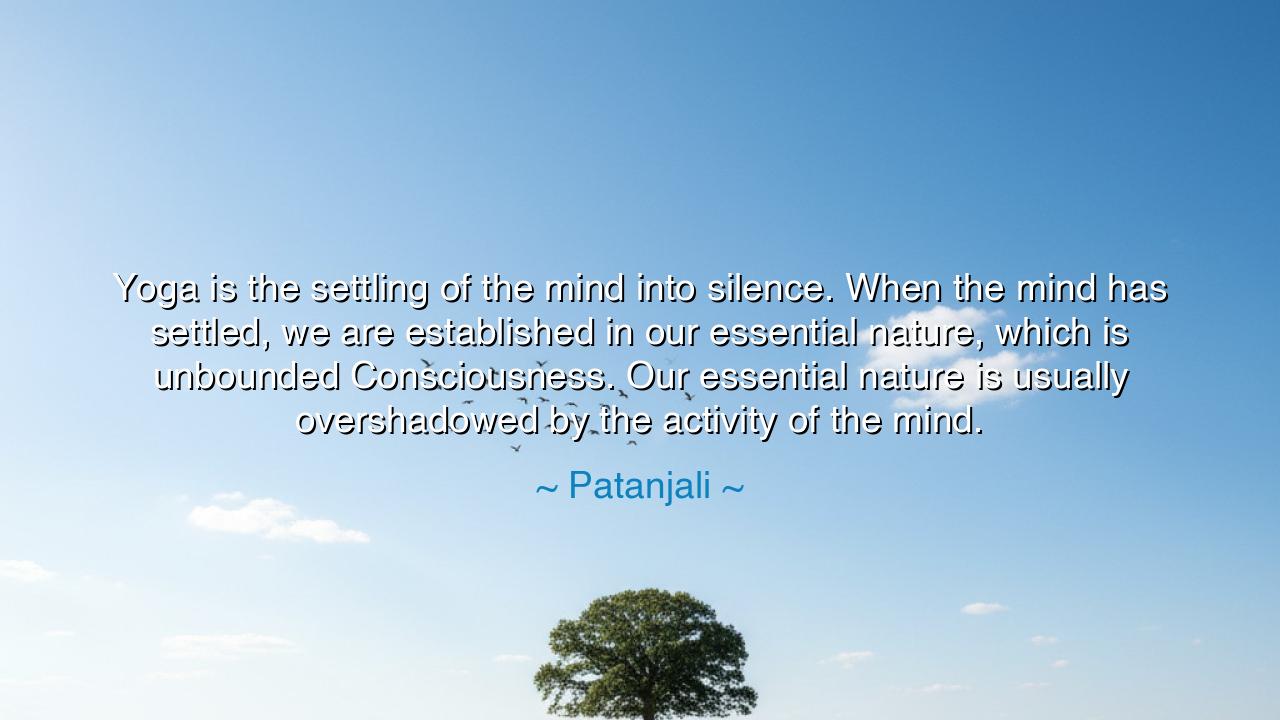
Yoga is the settling of the mind into silence. When the mind has
Yoga is the settling of the mind into silence. When the mind has settled, we are established in our essential nature, which is unbounded Consciousness. Our essential nature is usually overshadowed by the activity of the mind.






Hear now the timeless wisdom of Patanjali, the seer of ancient India, who in the Yoga Sutras proclaimed: “Yoga is the settling of the mind into silence. When the mind has settled, we are established in our essential nature, which is unbounded Consciousness. Our essential nature is usually overshadowed by the activity of the mind.” In these words lies not only the definition of Yoga, but the very path to liberation. For Yoga is not merely posture or breath; it is the great stilling, the calming of the restless waves of thought, until the lake of the mind becomes clear, and the light of the eternal Self is reflected without distortion.
The origin of these words lies in the philosophy of the Yoga Sutras, composed more than two thousand years ago, when sages sought to map the journey inward. Patanjali, gathering the wisdom of generations, described Yoga not as an external act, but as the union of self with the eternal. The mind, in its natural state, is full of agitation — thoughts rushing like a river, emotions rising like storms, memories and desires surging like winds. This activity clouds our vision, hiding the truth of who we are. But when the mind is brought into silence, we return to our essential nature: pure, unbounded Consciousness.
Consider the tale of the Buddha beneath the Bodhi tree. He, too, wrestled with the restless storms of mind: temptation, fear, doubt. Yet in the stillness of deep meditation, his thoughts dissolved into silence, and he awakened to his essential nature. His enlightenment was not the gaining of something new, but the revealing of what was always there, hidden by the ceaseless activity of thought. Here we see Patanjali’s truth embodied: when the mind settles, the Self shines forth like the sun when clouds part.
The meaning of these words is at once simple and profound. They tell us that our true Self is not the mind, not the shifting thoughts, not the endless chatter of memory and desire. The mind is but a tool, a mirror that can be clouded or polished. Our true Self is unbounded Consciousness — vast, timeless, free. But because we mistake the movements of the mind for our identity, we forget this truth. We live in shadows, thinking the flicker of thought is the light itself, when in truth the light is behind all shadows.
The lesson for us, O seekers, is that silence is the gateway to truth. Do not think that in stilling the mind you lose yourself; rather, in stilling the mind you discover yourself. The thoughts, fears, desires that you clutch are but passing clouds. Beyond them lies the sky of your being, infinite and serene. When you enter that silence, you are no longer bound by circumstance, no longer shaken by fortune or loss, for you are rooted in the eternal.
Therefore, take these practical actions: each day, even for a few moments, sit in stillness. Close your eyes, breathe deeply, and let the storms of thought pass without clinging to them. Practice patience, for the river of the mind will not settle at once, but with time and devotion, it will grow calm. In speech, seek silence; in action, seek presence. Remember that Yoga is not only what you do on the mat but the way you return, again and again, to the stillness of your essential nature.
So remember the words of Patanjali: “Yoga is the settling of the mind into silence.” Seek this silence, not as emptiness but as fullness, the wellspring of life itself. In silence, discover your unbounded Consciousness. In silence, rediscover your eternal Self. And in silence, walk in the world with peace, strength, and love, for you will no longer be overshadowed by the restless activity of the mind, but established in the radiance of what you truly are.






AAdministratorAdministrator
Welcome, honored guests. Please leave a comment, we will respond soon